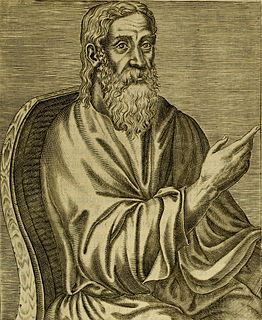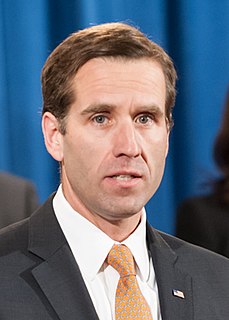A Quote by Erich Fromm
In our enthusiasm to dominate nature and to produce more material good - goods - we have transformed means into ends.
Related Quotes
Respecting the environment does not mean considering material or animal nature more important than man. Rather, it means not selfishly considering nature to be at the complete disposal of our own interests, for future generations also have the right to reap its benefits and to exhibit towards nature the same responsible freedom that we claim for ourselves. Nor must we overlook the poor, who are excluded in many cases from the goods of creation destined for all.
Excellence is a process, not just an outcome. Sure, we have to hold out for high standards in the products or services we provide. The goods must be more than "good enough." But so must our approach - you know, our methodology, the way we do business and deal with people. How could the ends be considered excellent if we can't be proud of the means?
The possessions God allows us to have are intended for our use, not our enjoyment. Trying to squeeze something out of them that was never in them in the first place is a futile endeavor. A cow's udders, gently pressed, will yield sweet milk, nourishing and refreshing. Applying more and more pressure will not produce greater quantities of milk. We lose the good of material things by expecting too much from them. Those who try hardest to please themselves with earthly goods find the least satisfaction in them.
We must not cast away riches which can benefit our neighbor. Possessions were made to be possessed; goods are called goods because they do good, and they have been provided by God for the good of men: they are at hand and serve as the material, the instruments for a good use in the hand of him who knows how to use them.
Do not worry! Earthly goods deceive the human heart into believing that they give it security and freedom from worry. But in truth, they are what cause anxiety. The heart which clings to goods receives with them the choking burden of worry. Worry collects treasures, and treasures produce more worries. We desire to secure our lives with earthly goods; we want our worrying to make us worry-free, but the truth is the opposite. The chains which bind us to earthly goods, the clutches which hold the goods tight, are themselves worries.
Three sorts of goods, Aristotle specified, contribute to happiness: goods of the soul, including moral and intellectual virtues and education; bodily goods, such as strength, good health, beauty, and sound senses; and external goods, such as wealth, friends, good birth, good children, good heredity, good reputation and the like.
We are so anxious to achieve some particular end that we never pay attention to the psycho-physical means whereby that end is to be gained. So far as we are concerned, any old means is good enough. But the nature of the universe is such that ends can never justify the means. On the contrary, the means always determine the end.
We will never have peace in the world until men everywhere recognize that ends are not cut off from means, because the means represent the ideal in the making, and the end in process, and ultimately you can't reach good ends through evil means, because the means represent the seed and the end represents the tree.
We've wanted to produce more in the 19th century and the 20th century in order to give man the possibility for more dignified human life; but actually what has happened is that production and consumption have become means - have ceased to be means and have become ends, and we are production crazy and consumption crazy.
In the 17 years since I graduated from this great College of Law, I have seen that, for many of us, it becomes increasingly easy to rationalize our actions in the name of expediency when facing difficult decisions-to choose a path where the ends justify the means. I want to ask you to challenge Machiavelli's philosophy. I want to humbly suggest that you be the guardians of a more complicated truth: that the means are as important-and sometimes even more important-than the ends.




































